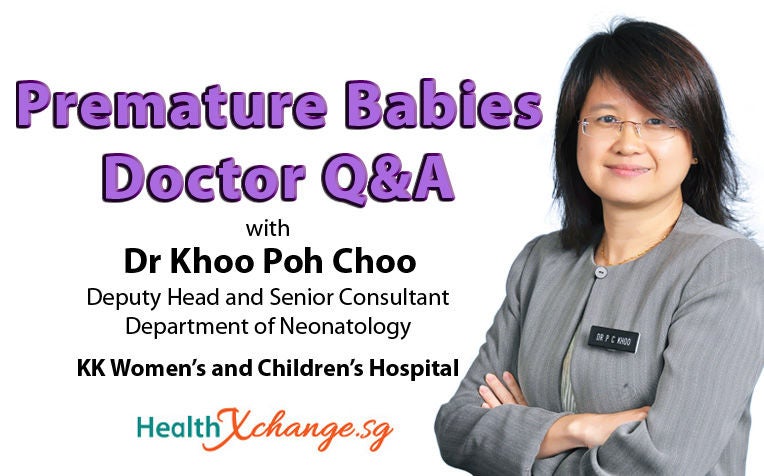
Ask Dr Khoo Poh Choo any question about premature babies.
Premature birth is the leading cause of death in children under the age of five worldwide.
Babies born too early may have more health issues than babies born full term, and are also more susceptible to long-term health problems affecting the brain, lungs, hearing or vision. Premature birth continues to be a global health issue and concern. It is estimated that 14.9 million babies are born before 37 weeks of gestation every year, 1 in 10 babies is born premature globally.
Close follow up for these children is important as it allows for detection of issues that may require early intervention. Early intervention has been shown to minimise the effects of disabilities and optimise the child’s potential.
In November's 'Ask the Specialist' forum, Dr Khoo Poh Choo, Deputy Head and Senior Consultant from the Department of Neonatology at KK Women's and Children's Hospital (KKH), a member of the SingHealth group, answers your questions about premature babies.
This Ask The Specialist forum has closed. Thank you for your interest and participation.
About Dr Khoo Poh Choo
Dr Khoo is the Head of the Neonatal Ambulatory Service, as well as Deputy Head and Senior Consultant in the Department of Neonatology, KK Women’s and Children’s Hospital (KKH).
Her main clinical areas of interest are in the long-term follow-up of premature and Very Low Birth Weight (VLBW) infants and she is currently in charge of KKH’s VLBW follow-up programme.
Dr Khoo is also the Director of the Universal Newborn Hearing Screening (UNHS) programme in KKH. She was awarded the SingHealth Health Manpower Development Plan award in year 2011 to undergo training in Canada on the “Early Developmental Screening and Health Related Quality of Life in High Risk Children including Very Low Birth Weight (VLBW) Children and Adolescents” and is also a recipient of a Singapore Ministry of Health, Health Sector Development Programme award in year 2014 for a project on the “Multidisciplinary Developmental Follow Up of the High Risk Infants”.
Dr Khoo's passion lies with KKH’s Early Bird Baby Club, a parent support group for premature infants and their families. She established the teaching programme for parents and caregivers of premature infants to help them in their preparation to take their babies home after their hospital stay. She has chaired and organised the World Prematurity Awareness events in Singapore in collaboration with the Light Weight Club Support Group in Singapore General Hospital and National University Hospital’s Neonatal Department since 2015.
Because #healthiswealth #healthforgood
Ref: L20

















 Get it on Google Play
Get it on Google Play